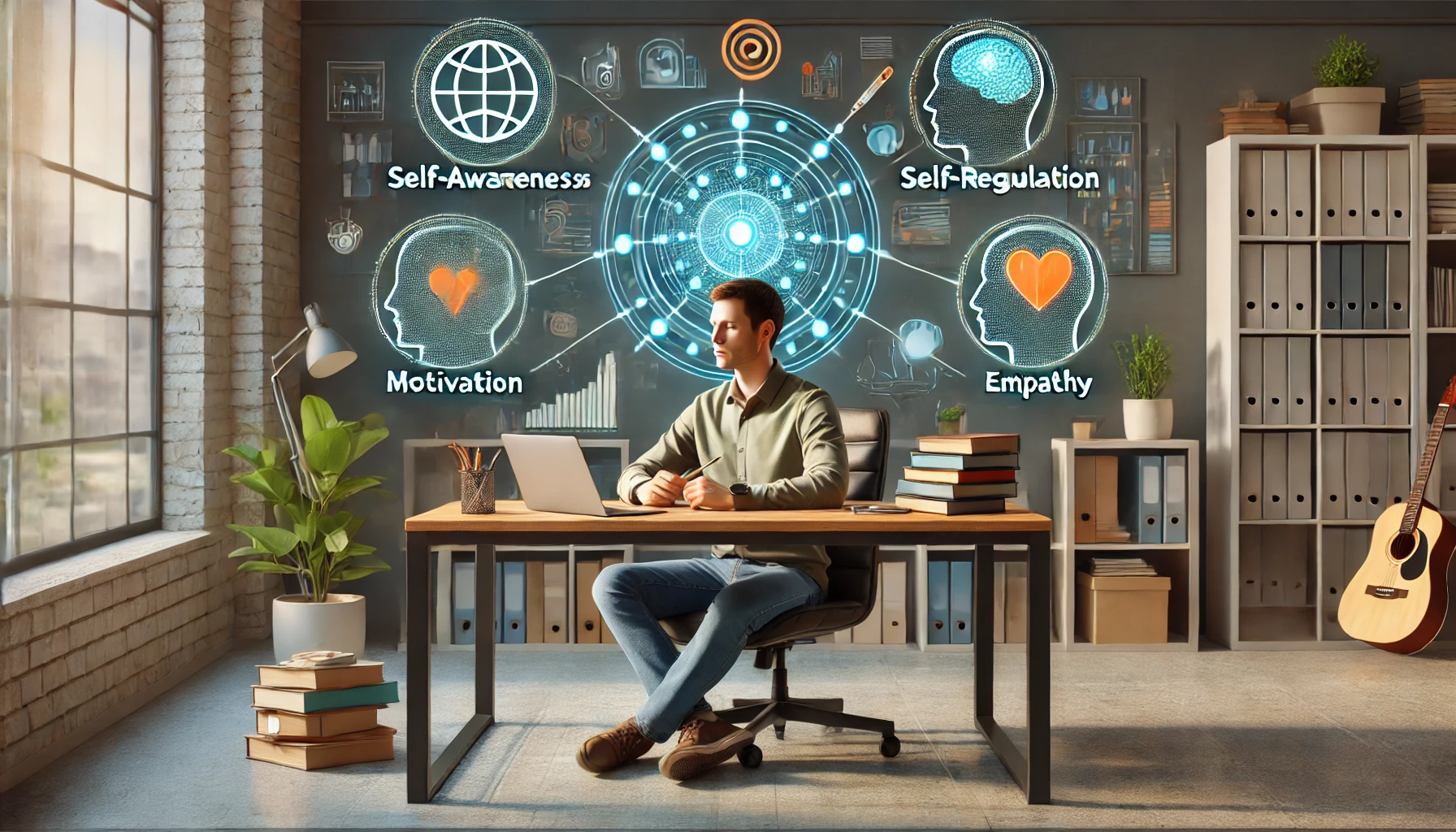Emotional intelligence (EI) refers to the ability to identify, understand, manage, and influence your emotions and the emotions of others. Unlike traditional intelligence, which focuses on problem-solving and cognitive abilities, emotional intelligence plays a crucial role in shaping how we interact with others and navigate various life situations. Daniel Goleman, a renowned psychologist, identified five essential components of emotional intelligence: self-awareness, self-regulation, motivation, empathy, and social skills. In this article, we will explore each component and provide practical tips on how to develop them in your daily life.
1. Self-Awareness: Understanding Your Emotions
Self-awareness is the ability to recognize and understand your emotions and how they affect your thoughts, behavior, and decisions. People with high self-awareness can identify their emotional states and are better equipped to manage their responses. They are aware of their strengths, weaknesses, and how their emotions influence their interactions with others.
How to Develop Self-Awareness
- Practice mindfulness: Mindfulness techniques such as meditation and deep breathing can help you become more attuned to your emotions. By practicing mindfulness, you can observe your emotional reactions without judgment.
- Keep an emotional journal: Regularly write down your emotions and reflect on how they influence your actions and decisions. This can help you identify patterns in your emotional responses and gain a deeper understanding of yourself.
- Ask for feedback: Seek constructive feedback from trusted friends, family members, or colleagues. They can offer valuable insights into how your emotions affect your behavior and relationships.
2. Self-Regulation: Managing Your Emotions
Self-regulation refers to the ability to manage your emotions, particularly in challenging situations. It involves controlling impulsive reactions and redirecting negative emotions into positive actions. People who practice self-regulation are better able to stay calm and composed in stressful situations, which helps them make better decisions and avoid conflicts.
How to Develop Self-Regulation
- Pause before reacting: When faced with a challenging or emotional situation, take a moment to pause and breathe. This simple technique can help you respond thoughtfully instead of reacting impulsively.
- Practice deep breathing: Deep breathing exercises can calm your nervous system and help you manage stress. Try inhaling deeply for four counts, holding your breath for four counts, and then exhaling for four counts. Repeat this several times to calm your mind and emotions.
- Create coping strategies: Identify healthy coping mechanisms that work for you, such as exercising, reading, or listening to music. These activities can help you release negative emotions and regain emotional balance.
3. Motivation: Staying Focused and Driven
Motivation refers to the ability to harness emotions to pursue goals with energy and persistence. People with high emotional intelligence are intrinsically motivated, meaning they are driven by internal rewards such as personal growth, fulfillment, and the pursuit of meaningful goals. Motivation enables you to stay focused and resilient, even in the face of setbacks or obstacles.
How to Develop Motivation
- Set meaningful goals: To stay motivated, it’s essential to set goals that align with your values and passions. Clearly defined goals give you a sense of purpose and direction.
- Break goals into smaller steps: Large goals can feel overwhelming. Breaking them into smaller, manageable tasks makes them more achievable and helps you stay motivated along the way.
- Celebrate small successes: Acknowledge and celebrate your progress, no matter how small. This positive reinforcement will keep you motivated and encourage continued effort.
4. Empathy: Understanding the Emotions of Others
Empathy is the ability to understand and share the feelings of others. It involves recognizing and acknowledging the emotions of those around you, responding with compassion, and offering support. Empathy is a critical component of emotional intelligence because it allows you to build strong, trusting relationships and navigate social situations with sensitivity.
How to Develop Empathy
- Listen actively: Practice active listening by giving your full attention to the speaker. Avoid interrupting or offering advice right away. Instead, focus on understanding their feelings and perspectives.
- Ask open-ended questions: Encourage others to share their emotions by asking open-ended questions like, “How did that make you feel?” or “What’s going on for you right now?” This shows genuine interest in their emotional experience.
- Put yourself in others’ shoes: Try to imagine what it would be like to be in someone else’s situation. This will help you develop a deeper understanding of their emotions and respond more empathetically.
5. Social Skills: Building Strong Relationships
Social skills refer to the ability to manage relationships and build networks. People with strong social skills can communicate effectively, resolve conflicts, and work well with others. They are also skilled at building rapport, influencing others, and collaborating in teams. Developing social skills is crucial for maintaining healthy relationships, both personally and professionally.
How to Develop Social Skills
- Practice effective communication: Pay attention to both verbal and non-verbal communication. Be clear, concise, and respectful in your interactions, and make sure to listen actively.
- Be open to feedback: Constructive criticism can help you improve your social interactions. Ask for feedback on how you communicate and work with others, and use it to enhance your social skills.
- Resolve conflicts calmly: When conflicts arise, approach them with a problem-solving mindset. Focus on understanding all perspectives, finding common ground, and working together to reach a solution.
Conclusion
Emotional intelligence is an essential skill that impacts every aspect of our lives, from our personal relationships to our professional success. By developing self-awareness, self-regulation, motivation, empathy, and social skills, we can improve our emotional well-being and build stronger, more meaningful connections with others. Developing these components of emotional intelligence takes time and practice, but with dedication and mindfulness, anyone can enhance their EI and lead a more balanced and fulfilling life.
